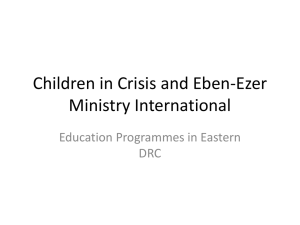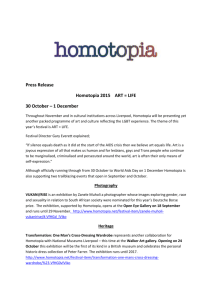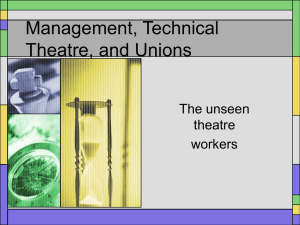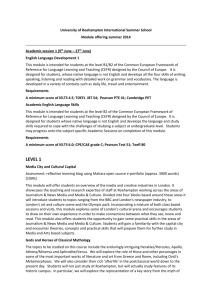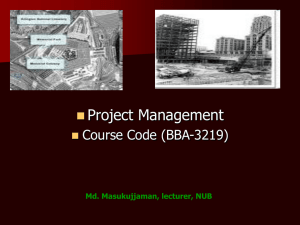BA (Hons) Contemporary Theatre and Performance (Sept 2014) last
advertisement
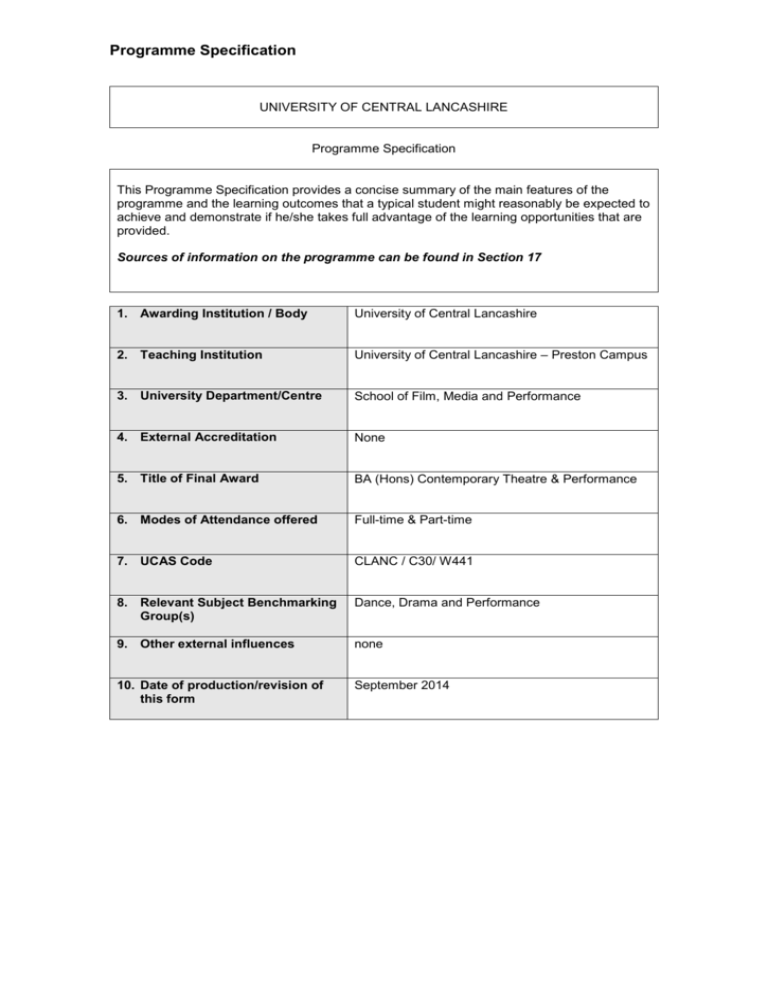
Programme Specification UNIVERSITY OF CENTRAL LANCASHIRE Programme Specification This Programme Specification provides a concise summary of the main features of the programme and the learning outcomes that a typical student might reasonably be expected to achieve and demonstrate if he/she takes full advantage of the learning opportunities that are provided. Sources of information on the programme can be found in Section 17 1. Awarding Institution / Body University of Central Lancashire 2. Teaching Institution University of Central Lancashire – Preston Campus 3. University Department/Centre School of Film, Media and Performance 4. External Accreditation None 5. Title of Final Award BA (Hons) Contemporary Theatre & Performance 6. Modes of Attendance offered Full-time & Part-time 7. UCAS Code CLANC / C30/ W441 8. Relevant Subject Benchmarking Group(s) Dance, Drama and Performance 9. Other external influences none 10. Date of production/revision of this form September 2014 11. Aims of the Programme The specific aims of BA (Hons) Contemporary Theatre and Performance are: 1. To give students a broad practical, critical, analytical and contextual understanding of contemporary theatre practices, that will equip students with skills that can be directly transferred into the work place. 2. To give students opportunities to develop the skills and attributes needed in order to devise original creative works in the area of contemporary theatre practices. 3. To prepare students with the knowledge of industrial networks and the skills required to prosper in challenging industry 4. To equip students with subject specific and generic transferable skills in line with the National Subject Benchmarks for Theatre and Dance degree courses. 12. Learning Outcomes, Teaching, Learning and Assessment Methods A. Knowledge and Understanding at level 4 A1.1 Identify the essential features of examples of contemporary practice. (RP1001) A1.2 Define key elements of contemporary performance and apply these in class-based tasks. (PF1000) Teaching and Learning Methods Across all modules and at all levels teaching and learning are synthesised from a variety of learning activities and opportunities. Knowledge and Understanding at level 4 is characterised by knowledge of the history and background of practice and practitioners. Learning situations include: lectures case studies seminars and discussion groups practical tutor – led workshops technical guidance group tutorials and verbal feedback individual tutorials Assessment methods practical activities workshops rehearsals and performances written submissions and presentations. B. Subject-specific skills at level 4 B1.1 Apply skills in a range of performance outcomes.(PF1000) B1.2 Identify strategies to improve technical, improvisation and performing skills. (PF1001) Teaching and Learning Methods Practical study occurs within analysis of contemporary and historical practice workshops rehearsals lecture/demonstrations performance/installation self-reflection and peer group evaluation. Assessment methods At this level the following activities are used for assessment: performance/installation processes leading to performances class contribution C. Thinking Skills at level 4 C1.1 Appreciate artistic intention and result. (PF1000) C1.2 Discuss theoretical concepts using appropriate critical language.(RP1001) C1.3 Contextualise your own practice within wider performative frameworks. (RP1001) Teaching and Learning Methods lectures workshops screenings study visits seminars and discussion groups individual and group tutorials Assessment methods At this level the following activities are used for assessment: performances presentations written assignments D. Other skills relevant to employability and personal development at level 4 D1.1 Identify activities that assist in the creation of a positive group dynamic within performance and other group work (PF1001) D1.2 Review the key factors in successful research and presentation of personal work, personal, team and time management skills. (RP1001) Teaching and Learning Methods lectures seminars screenings skills-based workshops ensemble rehearsals Assessment methods practical and performance work personal development plans class contribution peer responses A. Knowledge and Understanding at level 5 A2.1 realise performance with reference to an understanding of key performance theories; (PF2101 & PF2104)) A2.2 challenge the conventions of performance with reference to an understanding of key performance theories; (PF2102, PF2103 & PF2104) A2.3 formulate research into academic presentation material.(RP2001) A2.4 analyse the professional demands made on practitioners (RP2002) A2.5 appraise current criteria for arts funding proposals (RP2002) Teaching and Learning Methods A variety of teaching and learning methods are synthesised across all modules at level 5. Learning situations include: workshops rehearsal seminars and discussion groups lectures individual and group tutorials screenings study visits peer review technical induction Assessment methods At this level the following activities are used for assessment: performances presentations written assignments class contribution B. Subject-specific skills at level 5 B2.1 Explore appropriate methodologies towards the creation of: given and/or original text; visual theatre and performance physical performance; (PF2101/2/3/4) B2.2 Apply a knowledge of ‘production value’ in the generation of theatre performance; (PF2000) B2.3 Apply current methodologies in devising theatre performance. (PF2001) Teaching and Learning Methods Practical study occurs within analysis of contemporary and historical practice workshops software training rehearsals lecture/demonstrations performance/installation self-reflection and peer group evaluation. Assessment methods At this level the following activities are used for assessment: performance/installation processes leading to performances class contribution screenings C. Thinking skills at Level 5 C2.1 Test and contextualise methodologies towards the generation of interdisciplinary performance texts; (PF2000) C2.2 Employ appropriate critical language to: (PF2101/2/3/4 & RP2001) dissect given text. interpret visual discourse access and interpret physical vocabulary interrogate meaning within the diversity of contemporary arts practice C2.3 Demonstrate awareness of relevant critical and theoretical issues (PF2001) C2.4 Appreciate cultural value within theatre making and performance. (PF2001) Teaching and Learning Methods lectures seminars workshops screenings supervised rehearsals Assessment methods At this level the following activities are used for assessment: performances written assignments class contribution submission of interactive media hard copy D. Other skills relevant to employability and personal development at level 5 D2.1 Demonstrate strategies to direct and operate under direction. (PF2000) D2.2 Appraise and apply research methodologies appropriate to the development of contemporary practice; (RP2001) D2.3 Exploit personal development strategies based upon past and current opportunities.(RP2002) D2.4 Employ effective collaborative approaches. (PF2001) Teaching and Learning Methods Seminars Tutorials Workshops Study visits Practitioner-led events Assessment methods At this level the following activities are used for assessment: performances processes leading to performances class contribution A. Knowledge and Understanding at level 6 A3.1 Construct and conduct workshops that investigative and evaluate approaches to performance; (PF3001) A3.2 Apply appropriate research techniques; (RP3001) A3.3 Demonstrate a critical knowledge and understanding of interdisciplinary performance work(RP3006) A3.4 Critically examine the cultural value of devised theatre/performance. (PF3012,PF3011) A3.5 Formulate a research question that supports both theoretical and practical investigation and outcomes. (RP3002) Teaching and Learning Methods Knowledge and Understanding at level 6 is characterised by a synthesis of the relationships between theory and practice, intention and technical realisation. Learning situations include: lectures case studies seminars and discussion groups practical tutor – led workshops technical guidance group tutorials, peer review and formative verbal feedback one-to-one tutorials Assessment methods At this level the following activities are used for assessment: performances processes leading to performances presentations written assignments viva voce B. Subject-specific skills at level 6 B3.1 Define and apply an appropriate working methodology where theory and practice inform each other; (RP3002) B3.2 Realise, through the application of appropriate methodologies, interdisciplinary performance material for small scale performance; (PF3000) B3.3 Apply a range of methodologies to the devising process (PF3012,PF3011) Teaching and Learning Methods Practical study occurs within analysis of contemporary and historical practice workshops software training rehearsals lecture/demonstrations performance/installation self-reflection and peer group evaluation. Assessment methods At this level the following activities are used for assessment: performances processes leading to performances viva voce C. Thinking Skills at level 6 C3.1 Critically evaluate and contextualise your working process and ensuing product. (PF3000) C3.2 Plan and organise a personal programme of study within non-negotiable deadlines; (RP3001/2/3) C3.3 Incorporate critical thinking into the creative process (PF3012, PF3011) C3.4 Critically evaluate and contextualise innovative practice across a range of performance disciplines (RP3006) C3.5 Evaluate strategies to initiate creative work through practice-based study (PF3001) C3.6 Select learning opportunities (performance strategies, techniques and knowledge) in the furtherance of a performance methodology. (PF3001) C3.7 Demonstrate critical knowledge in an area that is of personal interest and also reflects the general content and ethos of the subject. (PF3012, RP3001) C3.8 Plan for, and engage in a process in which practical investigation leads to an informed or enhanced practical output. (RP3002) Teaching and Learning Methods lectures seminars workshops tutorial guidance Assessment methods performances presentations written assignments viva voce D. Other skills relevant to employability and personal development at level 6 D3.1 Manage and administrate human and technical resources within a public production; (PF3000 & RP3003) D3.2 Produce a body of written work that respects academic conventions. (RP3001/6) D.3.3 Disseminate your research findings in a form that respects academic conventions. (RP3002) D3.4 Reflect and evaluate the professional demands made on your own professional practice. (RP3003) Teaching and Learning Methods Outcomes within this category at level 6 are designed to bring to maturity the transition from study to workplace. They relate to the ability to administrate, manage and lead a team. Learning at level 6 should be independent and determined by self-devised goals and stimuli. Assessment methods At this level the following activities are used for assessment: performances processes leading to performances presentations written assignments viva voce 13. Subject Pathways 14. Awards and Credits Major Honours Level Module Module Title Code Credit rating Level 6 PF3000(L6) Performance 3 20 RP3002(L6) RP3001(L6) Practice-as-Research Project Dissertation 40 20 PF3012(L6) Devising: Text Visuality and the body 20 20 PF3011(L6) PF3001(L6) Contemporary Theatre Practices Student Defined Study 20 RP3006(L6) RP3003(L6) Critical Studies Professional Practice 2 20 20 PF2000(L5) PF2101(L5) PF2102(L5) PF2103(L5) PF2001(L5) PF2104(L5) Performance 2 Text and Performance Visual Performance Body in Performance Devising Technique 20 20 20 20 20 40 RP2002(L5) RP2001(L5) Professional Practice Performance Research 20 20 RP1001(L4) Performance Contexts 40 PF1001(L4) PF1000(L4) Preparation for Performance Performance 1 40 40 Level 5 Contemporary Performance Skills Level 4 Bachelor of Arts Degree with Honours Requires 360 credits including 120 at Level 5 and including 120 at Level 6 Bachelor of Arts Degree Requires 320 credits including 120 at Level 5 and including 40 at Level 6 Diploma of Higher Education Requires 240 credits including 120 at Level 5 Certificate of Higher Education Requires 120 credits including 100 at Level 4 15. Personal Development Planning Personal Development Planning (PDP) is a key aspect of all the performing arts courses at UCLan. PDP is integrated within all modules and across the totality of study. PDP, through the creation of a personal document referred to as a Progress File, helps you to define and focus your educational and professional aims and goals; it will assist you to consider how you can engage with the learning opportunities your course offers to achieve your personal career and professional objectives. This course consists of modules with fixed syllabi that together enable you and your colleagues to gain the knowledge and develop the skills essential if you are to be a successful practitioner. However the course is designed to allow you to choose or negotiate many aspects of your learning in ways which are appropriate to your abilities, learning preferences and vocational intentions. Thus is referred to as a student-centred learning approach. When coupled with the selfmonitoring and evaluation of PDP, you find that study shifts from a tutor-led/teaching activity to a personally-defined learning experience. This is close to the way many professional artists operate and the terms ‘reflective practitioners’ or ‘thinking artist’ describe the kind of graduate we expect you to become. 16. Admissions criteria Programme Specifications include minimum entry requirements, including academic qualifications, together with appropriate experience and skills required for entry to study. These criteria may be expressed as a range rather than a specific grade. Amendments to entry requirements may have been made after these documents were published and you should consult the University’s website for the most up to date information. Students will be informed of their personal minimum entry criteria in their offer letter. UK Applicants: Except in exceptional circumstances, UK applicants must attend an interview with audition. Once your application has been processed you will be sent a letter stating the date you that you are required to attend, and what will be required of you If it is not possible for you to attend on the date proposed, please contact us to rearrange a date or agree alternative arrangements. All successful candidates must have achieved the following: Achieve a minimum of 260-300 UCAS tariff points at A2 or equivalent Grade C in GCSE Maths and English or an equivalent; UK equivalents include key skills level 3 or functional skills level 2 European Applicants: European applicants may not be able to attend an interview in the UK. Once your application has been processed, you should submit an e-portfolio, CD or DVD of your recent work; this will be followed by a telephone interview. International Applicants : International applicants may not be able to attend an interview in the UK. Once your application has been processed, you should submit an e-portfolio, CD or DVD of your recent work; this will be followed by a telephone interview. Additionally International students for whom English is not your first language, will be required to evidence an IELTS score of 6.0 or equivalent. Equivalences include: TOEFL Written examination score of 550 plus a test of written English (at 4) TOEFL Computer Equivalent score of 213 and TWE at 4 Proficiency in English (Cambridge) at Grade C or above 17. Key sources of information about the programme www.uclan.ac.uk UCAS/Trottman guides BA (Hons) Contemporary Theatre & Performance fact sheet UCLan prospectus 18. Curriculum Skills Map – level 4 Please tick in the relevant boxes where individual Programme Learning Outcomes are being assessed Programme Learning Outcomes Module Level Code Module Title Core (C), Compulsory (COMP) or Option (O) Knowledge and understanding L4 A1.1 A1.2 PF1000 (L4) Performance 1 PF1001 (L4) Preparation for Performance RP1001 (L4) Performance Contexts x COMP Subject-specific Skills B1.1 B1.2 x Thinking Skills Other skills relevant to employability and personal development C1.1 C1.2 C1.3 D1.1 D1.2 x x x COMP COMP x x x x Curriculum Skills Map – level 5 Please tick in the relevant boxes where individual Programme Learning Outcomes are being assessed Programme Learning Outcomes Core (C), Compulsory Module (COMP) or Knowledge and Subject-specific Level Code Module Title Option (O) understanding Skills Thinking Skills Other skills relevant to employability and personal development L5 A2.1 A2.2 A2.3 A2.4 A2.5 B2.1 B2.2 B2.3 C2.1 C2.2 C2.3 C2.4 D2.1 D2.2 D2.3 D2.4 PF2000 (L5) PF2101 (L5) PF2102 (L5) PF2103 (L5) PF2001 (L5) PF2104 (L5} RP2002 (L5) RP2001 (L5) Performance 2 COMP Text and Performance O Visual Performance O Body in Performance O Devising Technique Contemporary Performance Skills x x Professional Practice COMP Performance Research COMP x x x x x x x x x x COMP O x x x x x x x x x x x x x Curriculum Skills Map – level 6 Please tick in the relevant boxes where individual Programme Learning Outcomes are being assessed Programme Learning Outcomes Module Level Code Module Title Core (C), Compulsory (COMP) or Option (O) Subjectspecific Skills Knowledge and understanding Other skills relevant to employability and personal development Thinking Skills L6 A3.1 A3.2 A3.3 A3.4 A3.5 B3.1 B3.2 B3.3 C3.1 C3.2 C3.3 C3.4 C3.5 C3.6 C3.7 C3.8 D3.1 D3.2 D3.3 D3.4 PF3001 (L6) RP3001 (L6) RP3002 (L6) PF3000 (L6) PF3011 (L6) PF3012 (L6) RP3003 (L6) RP3006 (L6) Student Directed Study COMP Dissertation O Practice-as-Research O x x x x x O Critical Studies COMP x x x Performance 3 COMP Contemporary Theatre Practices COMP Devising Text, Visuality and the Body O Professional Practice 2 x x x x x x x x x x x x x x x x x x x x x
